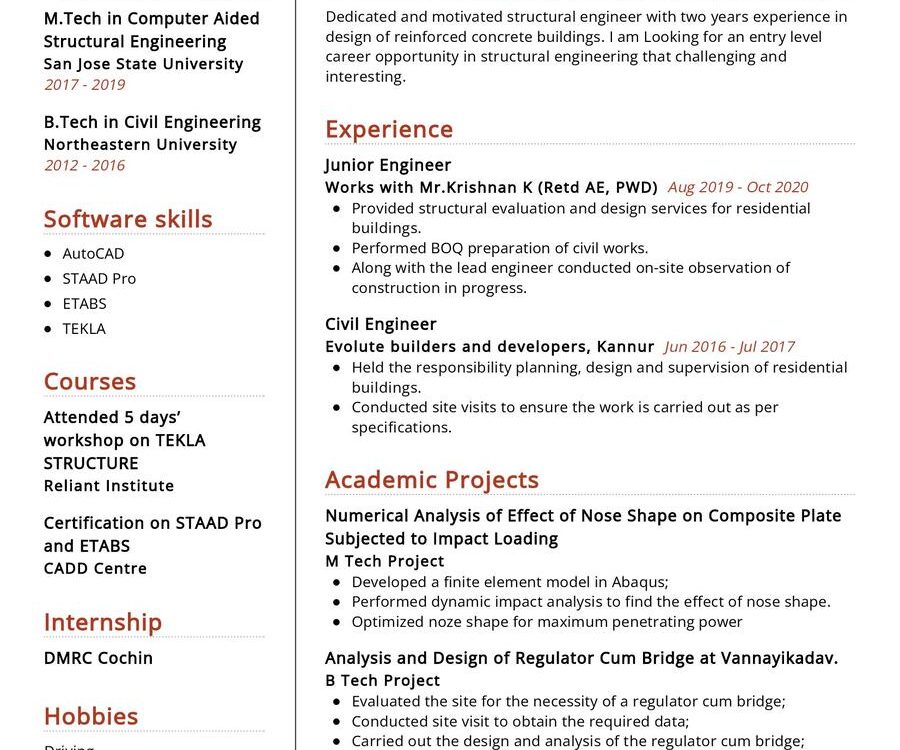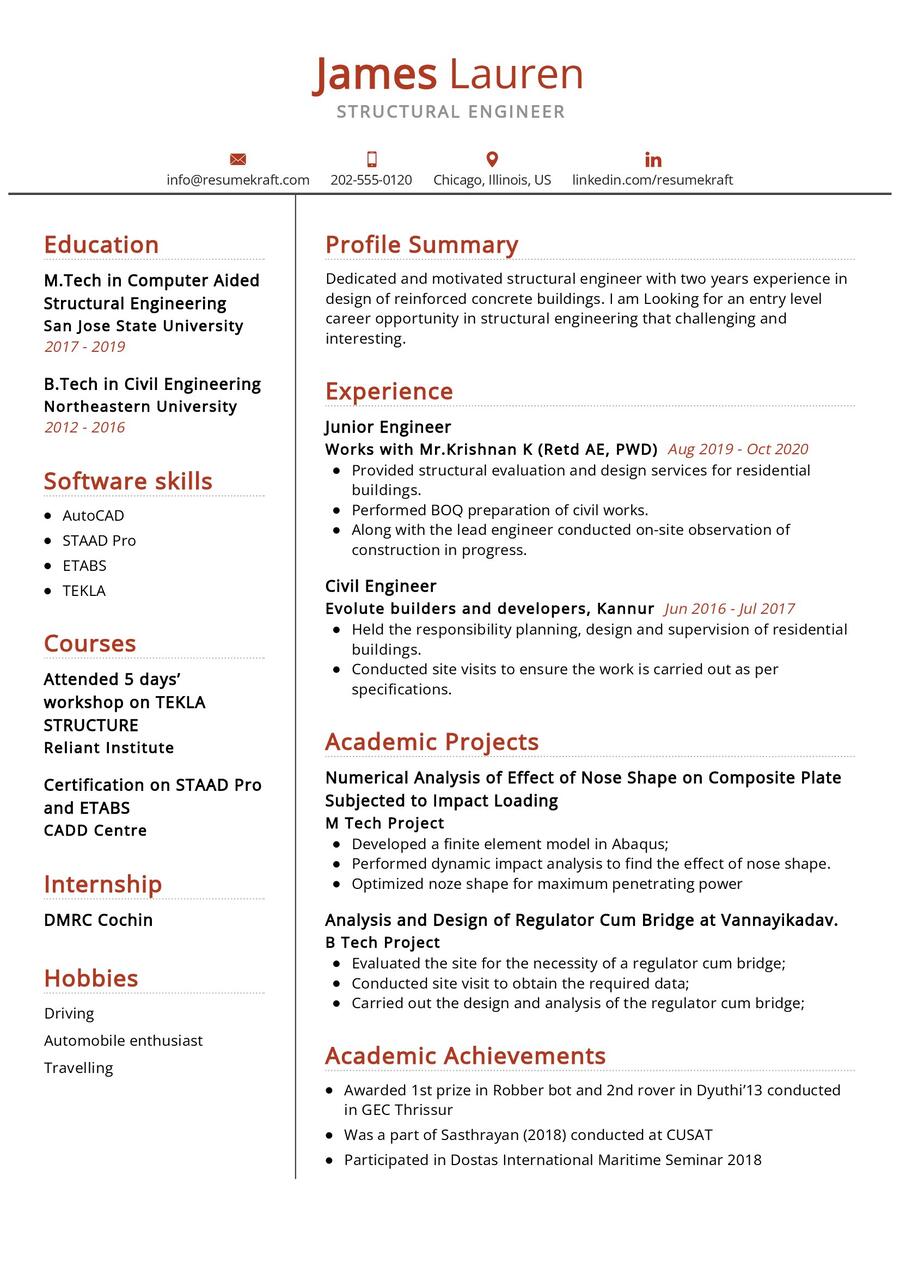Exploring the Role of a Structural Engineer
In the ever-evolving field of engineering, the position of a Structural Engineer plays a crucial role in shaping the built environment. This role blends technical expertise with problem-solving skills, contributing to the design and construction of safe and efficient structures. Let’s delve into the multifaceted responsibilities and qualifications that define the role of a Structural Engineer, a profession that requires a deep understanding of structural principles and innovative problem-solving.
Requirements for a Structural Engineer Position
Embarking on a career as a Structural Engineer necessitates meeting a set of rigorous qualifications, a journey marked by continuous learning and hands-on experience. Here are the prerequisites to embrace the role of a Structural Engineer:
- A Bachelor’s or Master’s degree in Civil or Structural Engineering, providing a solid foundation in the principles of structural design.
- Proficient knowledge of structural analysis software and familiarity with industry standards.
- Hands-on experience in structural design and analysis, showcasing a trajectory of increasing responsibility.
- Strong communication skills to effectively collaborate with architects, construction teams, and other stakeholders.
- Leadership qualities, honed through experiences and possibly through courses and certifications.
- Expertise in using tools such as AutoCAD, Revit, and other structural engineering software.
- Ability to work under pressure, adapting to the fast-paced environment of construction projects.
Additional certifications in structural engineering can enhance your profile in the competitive job market.
Responsibilities of a Structural Engineer
The role of a Structural Engineer is a tapestry of diverse responsibilities, weaving together technical proficiency, creative problem-solving, and a focus on safety. Let’s unravel the core responsibilities that define this role:
- Conducting structural analysis to ensure designs meet safety and compliance standards.
- Collaborating with architects and construction teams to develop efficient and cost-effective structural solutions.
- Preparing detailed structural designs and drawings using industry-standard software.
- Performing on-site inspections to monitor construction progress and address structural concerns.
- Providing expert advice on structural modifications and improvements during the construction process.
- Staying updated with advancements in structural engineering and incorporating best practices into projects.
- Ensuring compliance with building codes and regulations in all structural designs.
Each responsibility comes with its own set of challenges and learning opportunities, contributing to your growth as a Structural Engineer.
Structural Engineer CV Writing Tips
Crafting a CV that stands out in the competitive job market requires careful attention to detail and effective communication of your skills and experiences. Here are some tips to help you create a compelling Structural Engineer CV:
- Highlight projects where you played a key role in ensuring structural integrity and safety.
- Showcase your proficiency in relevant software tools, emphasizing your ability to bring designs to life.
- Quantify your achievements by including metrics such as cost savings, project completion times, or efficiency improvements.
- List relevant certifications, demonstrating your commitment to staying updated in the field.
- Personalize your CV for each application, aligning your skills and experiences with the specific job requirements.
Each tip contributes to creating a CV that reflects your expertise and positions you as a top candidate in the field of structural engineering.
Structural Engineer CV Summary Examples
Your CV summary is the opening statement of your professional journey, setting the tone for the reader. It should be a powerful snapshot of your experiences, skills, and the value you bring to the table. Here are some examples to inspire you:
- “Dedicated Structural Engineer with over 8 years of experience, adept at designing innovative and safe structures for diverse construction projects.”
- “Results-driven Structural Engineer with a proven track record in optimizing structural designs, ensuring cost efficiency and project success.”
- “Experienced Structural Engineer with expertise in seismic analysis, contributing to the resilience of structures in earthquake-prone regions.”
Each summary is an opportunity to showcase your unique strengths and experiences in the field.
Building a Robust Experience Section for Your Structural Engineer CV
Your experience section is the core of your CV, providing a detailed narrative of your professional journey. Here are some examples to guide you:
- “Led the structural design team for a high-rise residential project, ensuring compliance with local building codes and achieving project completion 15% ahead of schedule.”
- “Implemented innovative design modifications for a bridge construction project, resulting in a 10% cost reduction without compromising structural integrity.”
- “Conducted structural assessments for historic buildings, providing recommendations for restoration and preservation efforts.”
Each experience is a chapter in your professional story, demonstrating your impact and contributions to successful projects.
Educational Background for Your Structural Engineer CV
Your educational journey forms the foundation of your career. Here’s how you can list your educational milestones:
- Master of Science in Structural Engineering, XYZ University, a comprehensive program emphasizing advanced structural analysis and design, 2017.
- Bachelor of Science in Civil Engineering, ABC University, the foundational step in your journey towards becoming a structural engineer, 2015.
- Professional Engineer (PE) License, demonstrating your commitment to the highest standards of professionalism and ethics, obtained in 2018.
Each educational qualification is a building block in your journey toward becoming a proficient Structural Engineer.
Skills Essential for a Structural Engineer CV
Your skill set is a toolbox equipped with a diverse range of tools honed over the years. It is a showcase of your abilities, both innate and acquired. Let’s list down the essential skills that a Structural Engineer should possess:
Technical Skills:
- Proficiency in structural analysis software such as SAP2000 and ETABS.
- Experience in using AutoCAD and Revit for structural design and drafting.
- Knowledge of building codes and regulations governing structural design.
- Ability to perform seismic analysis and design earthquake-resistant structures.
- Familiarity with geotechnical engineering principles for foundation design.
Soft Skills:
- Effective communication and collaboration with interdisciplinary teams.
- Problem-solving abilities, especially in addressing unexpected structural challenges during construction.
- Attention to detail to ensure precision in structural designs and calculations.
- Adaptability to evolving project requirements and construction environments.
- Project management skills to oversee the structural aspects of construction projects.
Each skill is a tool aiding you in contributing to the safety and efficiency of structures.
Common Mistakes to Avoid When Writing a Structural Engineer CV
While crafting your CV, it is crucial to avoid common pitfalls that can hinder your chances of securing the desired position. Here are the mistakes often seen in CVs and how to avoid them:
- Avoid using generic language; tailor your CV to showcase your unique contributions and experiences.
- Instead of listing job duties, emphasize your achievements and the impact of your work on project success.
- Don’t underestimate the importance of a well-crafted cover letter to complement your CV and provide a more personalized introduction.
- Ensure your CV is accessible to a diverse audience by avoiding excessive technical jargon.
- Proofread your CV thoroughly to present a polished and professional image to potential employers.
Each mistake is a potential stumbling block; avoid them to create a CV that stands out and accurately represents your qualifications.
Key Takeaways for Your Structural Engineer CV
As we conclude this comprehensive guide, let’s recap the key points to keep in mind while crafting your Structural Engineer CV:
- Emphasize your role in ensuring structural safety and efficiency in diverse projects.
- Showcase your proficiency in relevant software and tools used in structural engineering.
- Quantify your achievements to provide a tangible demonstration of your impact.
- Include a section on ongoing professional development, highlighting relevant certifications and courses.
Finally, feel free to utilize resources like AI CV Builder, CV Design, CV Samples, CV Examples, CV Skills, CV Help, CV Synonyms, and Job Responsibilities to create a standout application and prepare for the Structural Engineer job interview.


